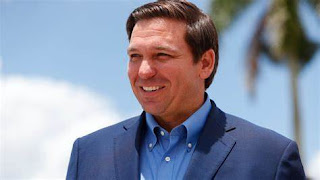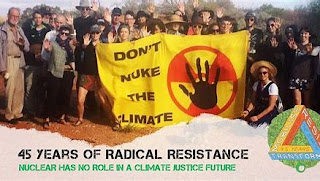by Rod Williams, Sept. 21, 2021 - I am convinced that climate change is real and we are running out of time to address it and that thus far our efforts to do so have been anemic, ineffective, symbolic, and even counterproductive. Why is that the case?
In a family email exchange recently on the topic of climate change, a close relative who is passionate about the issue of climate change said we were destroying the planet and she blamed, "Republicans and Fox News." A am sure there are many of her persuasion who would agree with that simplistic explanation. After all, President Donald Trump said he believed that climate change is a hoax invented by the Chinese to deter American economic growth. Donald Trump however is the exception. Most significant Republicans accept the reality of climate change and few Republican skeptics have been as blunt as Trump. Most Republicans have been silent or have opposed bad policies that needed to be opposed.
Republicans have been in opposition to many liberal climate change proposals and with good reason. Many of those efforts would wreck the economy and some were simply symbolic and would accomplish little while costing much. It does nothing to combat climate change for America to forgo energy independence, as an example. We simply replace the oil not produced in America with oil from authoritarian mid-Eastern regimes. Some liberal environmentalist positions, such as opposition to nuclear energy and fracking, actually increase the volume of greenhouse gases in the atmosphere.
Beyond the legitimate practical policy reasons for opposing ill-conceived liberal responses to the challenge of climate change, however, those who blame Republicans for lack of progress on climate change have a point. In America, most climate change skeptics have been and still are Republicans. So, as long as liberals can blame "Republicans and Fox News," for the failure to respond to the challenge of climate change they do not have to look very hard at why the response to the challenge of climate change has been such a failure. As long as they can blame Republicans they can excuse themselves for failure to put forth real solutions to the ongoing challenge.
The Republican opposition to action on climate change is not all because of disagreement about how to approach the issue, however. There is genuine climate change skepticism, what the liberal mainstream call climate change "denial." While I was convinced a long time ago of the validity of the climate change theory, many have not been convinced. If one is not convinced, then one sees no reason for any action at all.
Many have been unconvinced because of the voice of influencers like the late Rush Limbaugh who ridiculed and lambasted the theory and was entertaining while doing so. Rush was the original personality who gave voice to and influenced the thinking of the conservative masses, and in his wake came many others, such as Nashville's own, the late, Phil Valentine. Those who came on the scene behind Rush continued to promote climate change skepticism.
 Following the popularization of climate change skepticism pushed by Limbaugh and then a whole host of other conservative commentators and influencers who followed, it seems to me that conservative voices that could have entered the debate were simply silent. I don't think most Republican leaders were ever as staunchly skeptical as the Rush Limbaughs of the world, however.
Following the popularization of climate change skepticism pushed by Limbaugh and then a whole host of other conservative commentators and influencers who followed, it seems to me that conservative voices that could have entered the debate were simply silent. I don't think most Republican leaders were ever as staunchly skeptical as the Rush Limbaughs of the world, however.
In fact, there have been leading Republican voices who recognized climate change as a serious problem and who took meaningful action to combat it. President Ronald Reagan's Secretary of State George Shults negotiated the Montreal Protocol, which phased out the use of chlorofluorocarbons and other ozone-depleting chemicals. Those chemicals also are potent greenhouse gases, so the agreement also makes him the negotiator of one of the most effective global climate treaties ever. Following George Shultz was James Baker as Secretary of State who advocated strong action on climate change. Other prominent Republicans followed.
You may recall the 2008 commercial that featured Nancy Pelosi and Newt Gringish sitting close together on a loveseat and the two political foes say concern about climate change is the one thing they have in common. “We do agree,” Gingrich says. “Our country must take action to address climate change.”
Up until the election of Donald Trump climate change skepticism was not a prominent position among establishment Republicans. That changed with Trump. Trump did not only not hide his skepticism or keep quiet he used it to rally his populist base who had been raised on Rush Limbaugh. Trump was not the only Republican pushing skepticism, however. Senator Jim Inhofe, Republican of Oklahoma, and Congressman Steve Scalise, Republican Of Louisiana were among the most vocal of Republican skeptics.
In an environment where climate change skepticism was the norm among much of the Republican base and where there were popular Republican politicians advocating skepticism, if you were a Republican politician who actually accepted the theory of climate change as valid, then there was nothing to be gained by saying so. And, the liberal response to the challenge of climate change was so misguided that one could oppose liberal climate change positions on legitimate grounds of opposing bad policy and never have to advocate skepticism nor have to offer alternative proposals of one's own. Liberals made it easy for conservatives to oppose liberal environmental policies. To stay in good graces with the Republican base, all a Republican had to do was oppose liberal lunacy.
Since Republicans were mostly absent from the debate, why didn't Democrats and passionate environmentalists come up with policies that would actually accomplish something? Why have responses to the challenge been so feeble or why have policies even been advanced that made global warming worse?
I contend it is because liberals have inherent blind spots and beliefs that make it difficult for them to offer real solutions. Here is some of what I see as to why liberals have failed to advance policies that address the issue.
Liberals are at heart romantics. They exhibit strong emotions, have awe of nature, reject modernity, and they rebel at rationalization. They see the battle to stop climate change in almost spiritual terms. If we all simply loved mother earth enough and would renounce the modern world the problem would be solved.
Many liberal environmentalists can not separate their general left-wing policies from their desire to do something about climate change. There is a term "watermelon" used to describes certain environmentalists as green on the outside and red on the inside. That may be too strong of a term, and it certainly does not help to further dialogue to actually refer to an environmentalist with that term but it is, I think, useful to keep in mind. Failure to separate their other liberal believes from a desire to deal with climate change is, I think, one of the reasons why we have not made real progress on combating climate change.
The proposed $93 trillion (yes "trillion") Green New Deal is an example. It would massively expand the scope of the Federal government and have an army of bureaucrats dictate details of how the economy functions. It relies heavily on central planning. From Cuba to Venezuela to the old Soviet Union central planning has been a failure. China, while still engaging in central planning, does not do so nearly to the extent it did in the era of Mao. China has let prices, for the most part, allegate resources.
In addition to central planning of the economy, the GND also calls for things like single-payer health care and guaranteed national income. These are proposals that go way beyond saving the planet. Often environmentalists talk about environmental justice and social justice and equity. Failure to stay focused on just climate change makes their proposals unacceptable for reasons that have nothing to do with the issue at hand.
Liberal environmentalists are "economics deniers." If climate change skeptics qualify for the pejorative term "climate change deniers," liberal environmentalists certainly qualify for the term "economics deniers." They either do not believe in economics or are ignorant of economics. One has to look no further than the proposed $90 trillion Green New Deal to see this. Consider that the current GDP of the United States is about $22 trillion. The current public debt of the United States is $28.5 trillion and growing and equals about 108% of GDP. The Green New Deal proposal is like a household making $22,000 a year, already in debt $28,000, and proposing they buy a $90,000 boat. How can anyone take environmentalists seriously when this is their proposal?
Beyond the fact that the math doesn't work, environmentalists do not recognize the superiority of the role of markets in allocating resources over command and control and central planning. People resist command and control and central planning usually fails. Not only that but command and control economies with central planning have a worst environmental record. Also, it seems liberal environmentalists never submit their proposals to cost-benefit analysis. It appears to me that most liberal environmentalists are incapable of thinking in economic terms and weighing alternatives. Their enthusiasm, or evangelical zeal, or certainty of the righteousness of their cause, makes them see concern over how one will pay for it or how a proposal will work in practice, look vulgar and mundane.
The more rational liberals fear their base and the zealous enthusiast are in the driver's seat. Just as on the right, the more rational voices are being drowned out by the loud populists and politicians fear to disagree with the base, I think the same is happening on the left. Liberals who might see the folly of the GND or recognized that to surrender American energy independence does nothing to solve the problem of climate change are simply too intimidated to disagree with the enthusiast.
With these limitations, liberals are never going to put forth proposals that would make a difference. What is needed are people who are realists sitting at the table discussing the issues. We need people who are not starry-eyed utopians and romantics. We need people who are focused on the issue at hand and not using environmentalism to push a socialist or social-justice agenda. And, we need people who understand economics and can think rationally. We need realists to join the debate.
Fortunately, there are some rational voices advancing solutions to the climate change challenge. Unfortunately, those voices are faint. In a future essay, I will explore what a realist climate change policy would entail and we will hear from some of the advocates of climate change realism.
For other essays in this series, see the following:
Get real about Climate Change. Part 1: Climate change is an established fact and time is running out to do anything about it.
Get real about Climate Change. Part 2: So far what we are doing about climate change is ineffective, anemic, symbolic, and counterproductive.

 Top Stories
Top Stories











